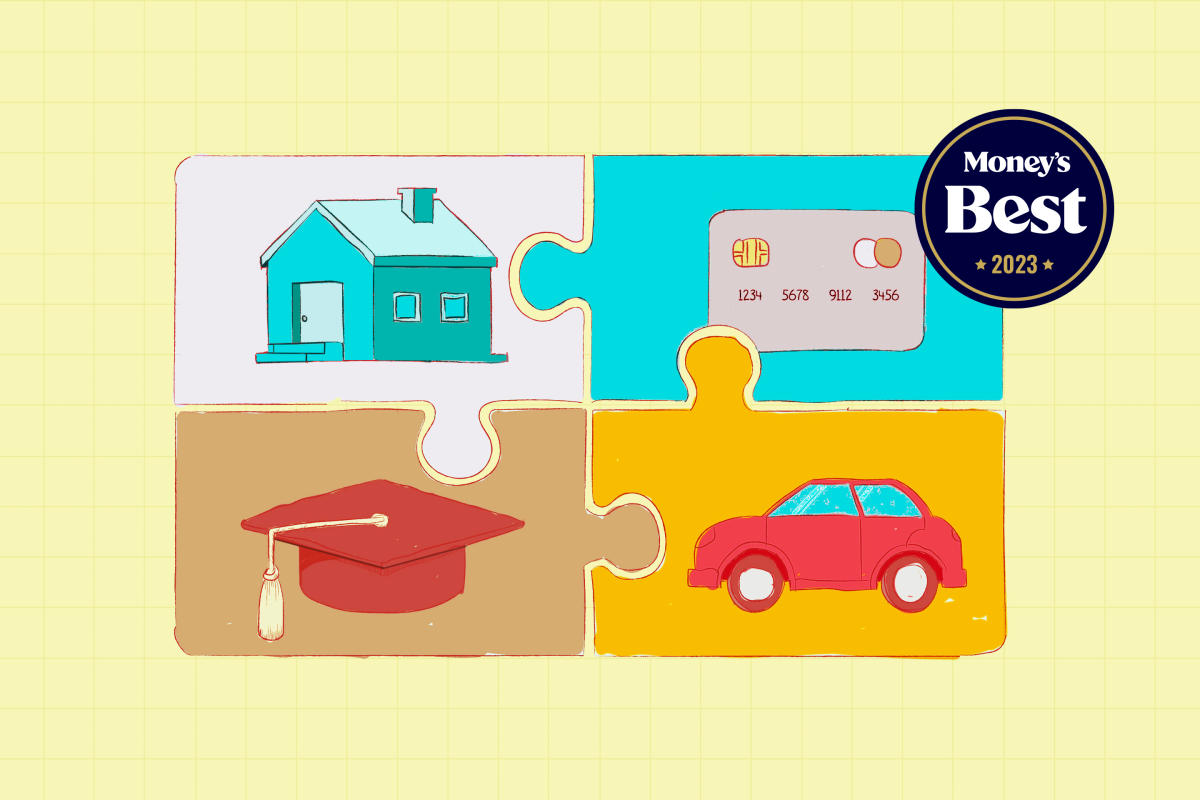Personal Finance
6 Best Debt Consolidation Loans of 2023

Our Partners
Top Partner
Our Partner
VISIT SITE
-
Significantly reduce your debt
-
100% free consultation with a certified debt specialist
-
For people with $15,000+ in debt
-
Pay off your debt in 12-48 months
-
No upfront enrollment fees
-
No minimum credit score
-
A+ Rating with the BBB
Our Partner
VISIT SITE
-
No upfront fees
-
One-on-one evaluation with a debt coach
-
Become debt-free in 24 to 48 months
-
For people with $7,500 in unsecured debts and up
-
Rated A+ by Better Business Bureau
Our Partner
VISIT SITE
-
Free, personalized evaluation from certified debt consultants
-
Over 750,000 clients have enrolled in the Freedom Debt Relief program since 2002
-
American Fair Credit Council accredited
-
Settled over $10 billion in client debt since 2002
-
For people with $15,000 in unsecured debts and up
-
No upfront fees
Our Partner
VISIT SITE
-
Debt consolidation loans up to $100,000
-
Flexible repayment terms with your budget in mind
-
Free quotes are offered
-
“A” Rated by the BBB
-
Reviewing offers won’t impact credit
-
Easy pre-approval process with instant decision
Our Partner
VISIT SITE
-
Free credit consultation
-
Eliminate your debt in 30 to 60 months
-
A+ Better Business Bureau Rating
-
Debt self-help tools and financial education resources
-
5 million Americans helped in 20 years
Our Partner
VISIT SITE
-
Get started quickly, no upfront fees
-
15 years in business with BBB A+
-
Personal Account Manager to help settle your debt
-
One low program payment, tailored to your budget
-
Online Client Portal, for easy 24/7 access
-
Free no pressure consultation to review all options
-
24-48 month program, no upfront fees
Our Partner
VISIT SITE
-
Free consultation & free quote
-
Debt settlement of up to $100,000
-
Awarded the Ekomi Gold Seal
-
Customized debt resolution programs
-
Negotiates payments into one monthly bill
Our Partner
VISIT SITE
-
A+ BBB Accredited
-
Client rating 9.4 stars
-
100% Service Guarantee
-
No upfront fees
-
Free savings quote online or by phone
-
Professional debt consultants
-
See below disclosures
Our Top Picks for Best Debt Consolidation Loans of 2023
-
LightStream – Best for excellent credit
-
SoFi – Best for no fees
-
PenFed – Best for small debt
-
Fiona – Best for comparing lenders
-
Discover – Best for credit card debt
-
Marcus by Goldman Sachs – Best for fair to excellent credit
Best Debt Consolidation Loans Reviews
Pros
-
0.25% APR discount with Autopay
-
You can defer a month after 12 on-time payments
-
Pays creditors directly
-
#1 in the 2022 U.S. Consumer Lending Satisfaction Study by J.D. Power
Cons
-
Loan disbursed within five days after approval
-
Not suitable for smaller debt
Why we chose it: Marcus by Goldman Sachs is the highest ranking lender in the 2022 J.D. Power Customer Satisfaction Study, and it offers some of the lowest debt consolidation interest rates out there.
Marcus by Goldman Sachs ranked #1 among personal loan lenders in the 2022 U.S. Consumer Lending Satisfaction Study by J.D. Power. It offers loans ranging from $3,500 to $40,000 with a fixed APR starting from a very low 6.99% to 24.99%. Potential borrowers can obtain customized loan options and pre-approval in less than 10 minutes.
Marcus debt consolidation loans also offer plenty of useful features. To start, Marcus will pay up to 10 of your creditors without charging any fees. It also rewards customers for paying on time, by providing a deferral option for those who have made 12 consecutive on-time payments. (Note that, while the deferred month will not accrue interest, the loan will be extended at the end of the term and will accrue interest then. However, it does provide a chance to pay off the loan before that added month and save the interest.)
Marcus doesn’t charge any origination, prepayment or late fees on its personal loans. Nevertheless, late, incomplete, or missed payments can result in a default under the Installment Loan Agreement.
One of the disadvantages is that Marcus can take up to five business days to fund the loan, which is a bit slow compared to other lenders, who tend to pay in 1-2 business days.
Pros
-
No fees for loan origination, late payments or prepayment
-
It can offer lower interest than competitors under certain conditions
-
0.50% rate discount for setting up Autopay
-
Terms from 2 to 12 years
Cons
-
Doesn’t provide loan pre-approvals
-
Doesn’t accept loan information via phone or fax
-
Autopay discount only available before loan disbursement
Why we chose it: Lightstream is our top choice for large loans because of its $100,000 maximum and its flexible payment terms from two up to 12 years.
LightStream offers personal loans up to $100,000 annual percentage rates (APR) ranging from 7.99% to 23.99% with its Autopay discount. Its terms range from 2 to 12 years, the widest range among the companies we evaluated.
You can check payment term options by entering your desired loan amount in their debt consolidation loan calculator. Note that this calculator only provides a general calculation based on your desired loan amount and using the lowest possible interest rate. If your credit is anything below excellent, you will probably not get that low of an interest rate.
With its Rate Beat Program, Lightstream will offer an interest rate .10% lower than any competitor’s, but only if you were already approved for the competitor’s lower rate. This means you’d have to apply for both loans and actually get a lower APR elsewhere.
Lightstream is a good option for those with excellent credit who need a large loan. Lightstream requires good to excellent credit, an established credit history, various open accounts like credit cards and car loans, savings accounts or liquid assets, and a stable and sufficient income.
This lender doesn’t charge any fees or prepayment penalties on their personal loans. If the customer is not satisfied with their loan experience within the first 30 days, they can contact customer service and receive a questionnaire. After Lightstream evaluates the issue, the borrower can receive $100 compensation.
Pros
-
Unemployment protection
-
Pays lenders directly
-
Accepts co-applicants
-
Loan disbursement in one or two business days unless paying directly to creditors
Cons
-
3 to 7 year term range isn’t as varied competitors
-
Not open to Mississippi residents
-
Co-applicant must live in the same residence as the primary borrower
Why we chose it: SoFi’s consolidation loans don’t charge any origination, prepayment or late payment fees; additionally, they offer multiple ways to get discounts on their rates.
SoFi offers personal loans with interest rates starting at 7.99% APR (with Autopay discount) and charges no extra fees or prepayment penalties. The company also provides online prequalification with a soft credit pull and fixed rates for the life of the loan.
SoFi caps its rates at 23.43% APR with an Autopay discount. If the customer declines the Autopay option, interest rates will be 0.25% higher.
This company funds most personal loans on the same day of approval — unless the loan is for more than $20,000 or the borrower enrolls in Direct Pay, a service where SoFi pays lenders directly and the borrower doesn’t actually receive the funds. (Note that those who enroll in Direct Pay obtain an additional 0.25% APR discount on their loan rate.)
With their Unemployment Protection feature, SoFi offers temporary payment modification and job placement assistance if a borrower were to lose their job. This benefit is offered in three-month increments for up to 12 months. Note that interest rates will continue to accrue during that period of time. To qualify, borrowers have to also qualify for governmental unemployment compensation and actively participate in SoFi’s Career Advisory Group as part of their job search.
The SoFi mobile app, available for iOS and Android, gives customers 24/7 access to their loan, checking and savings accounts, investments and other banking features.
Although its main competition offers longer payment terms, SoFi’s various additional banking services, accessible customer service and comprehensive mobile app make it an excellent choice for anybody looking for a no-fee loan that can be more easily paid during that maximum seven-year period.
Pros
-
Apply and check application status online
-
Accepts co-borrowers
-
No origination fee or prepayment penalty
Cons
-
You need to be a credit union member for disbursement
-
No Autopay discount
Why we chose it: PenFed’s minimum $600 loan amount paired with its high customer satisfaction and low interest rates make it the best choice for debt under $1,000.
Pentagon Federal Credit Union, known as PenFed, offers fixed-interest rates starting at 7.74% APR and terms up to 60 months for their debt consolidation loans. Borrowers looking for a small loan will be glad to know that there’s a $600 minimum you can apply for.
You don’t have to be a PenFed member to check your rates and get pre-approved. However, were you to actually apply for the loan, you’ll need to become a credit union member. PenFed will open a savings account in your name preloaded with $5 to establish your membership. After approval, the loan is disbursed within 1-2 business days.
PenFed doesn’t charge origination or early payment fees, but it does charge a $29 late payment fee to those submitting their payment more than five days late.
PenFed features a mobile application for iOS and Android where members can check their loan status, make loan payments and transfer money between accounts.
Pros
-
Works with any type of credit
-
Online application process and loan calculator
-
Partners with TransUnion to provide credit score
-
Some lenders offer personal loans up to $250,000
Cons
-
Credit requirements depend on the company selected
-
Some of its lenders will charge an origination fee of up to 6% of the loan amount
Why we chose it: The Fiona marketplace allows borrowers to browse and compare multiple online lenders using different search factors like credit score and location.
Fiona offers personal loans for debt consolidation from an array of lending partners and for all types credit, from poor to excellent. It partners with renowned companies such as LendingClub, SoFi, Avant and Marcus by Goldman Sachs.
Unlike most lenders on this list, some of Fiona’s lending partners offer secured personal loans for debt consolidation. Secured loans require a property or assets to back up the loan. A car title, stock investments, equity from life insurance policies, real estate, and precious metals are some of the properties and assets that Fiona’s partners accept as collateral for a secured personal loan. Do note, however, that were you to default on a secured loan, the lender could sell that collateral in order to pay the loan.
Among other loan offers, there’s refinancing for unsecured and secured loans, including auto, student loan and mortgage refinance.
Since Fiona is not a lender itself, but a marketplace, fees will depend entirely on the lender you’re matched with, so be sure to read the fine print during your application process.
Pros
-
Pays lenders directly
-
Same-day approval
-
You can return loan funds within 30 days
-
You can apply online or by phone
Cons
-
Minimum household annual income of $25,000
-
Late payment fee of $39
-
Funds cannot be used to pay secured loans or Discover credit cards
Why we chose it: Discover has some of the lowest interest rates in debt consolidation, a variety of options aside from loans and a rare 30-day guarantee if you need to return the funds.
Discover doesn’t charge any origination or prepayment fees, and its personal loan rates range between 6.99%-24.99% APR, some of the lowest minimum APRs available.
Discover features same-day approval in most cases, and loan funds are deposited into a savings or checking account within 1-2 business days. If a client is not satisfied with their experience or has the ability to pay back quickly and without interest, they can return the funds within 30 days.
While there’s no pre-established minimum FICO score requirement, Discover does require a minimum of $25,000 in annual income and, like most other lenders, evaluates debt-to-income ratio, credit history, application information and the selected payment term.
Clients can access 24/7 customer service over the phone and through the Discover mobile app for iOS and Android. They can also check their FICO score, access their bank account, make payments, and check balances through the app.
Other lenders we considered
For our top list, we analyzed several debt consolidation loan lenders and selected the ones with competitive interest rates, excellent customer service and a variety of loan terms. The following companies didn’t stand out in those categories, but they might be a good fit for your needs.
National Debt Relief
Pros
-
Offers debt management services
-
Free consultation
-
Negotiates with creditors to settle client’s outstanding debt
-
Online quote
Cons
-
Not a loan originator
-
Only works with clients that have at least $7,500 in debt
-
Charges a fee of 15-25% of the debt amount
Why it didn’t make our top picks: National Debt Relief didn’t make it to our main list because it’s not a loan originator but instead a debt consolidation company or debt management service.
National Debt Relief services include options for consolidation loans, credit counseling services, and bankruptcy referrals. To qualify, borrowers need to have at least $10,000 in unsecured debt. National Debt Relief also charges a fee of at least 15% of their client’s debt amount.
Happy Money
Pros
-
Payoff loan with customizable terms, rates and monthly payment
-
Interest rates start at 8.99%
-
Pays creditors directly
Cons
-
Loans start at $5,000
-
Origination fee of 0%-5% of loan amount
-
Approval takes 5-7 business days
Why it didn’t make our top picks: Happy Money charges an origination fee and their process is longer than other top lenders.
Happy Money partners with credit unions to provide low interest rates and a low minimum credit score requirement. This company doesn’t charge any application, prepayment or late fees. However, it does charge an origination fee of up to 5% of the loan amount. Obtaining loan approval can take from 5 to 7 business days, and if you choose the option to pay creditors directly, funding can take up to two weeks.
Best Egg
Pros
-
Approval in minutes
-
APR from 8.99%-35.99%
-
Funds within 24 hours after approval
-
Personal loan calculator
Cons
-
Origination fee of 0.99-5.99% of the loan amount
-
Origination fee on a loan term 4-years or longer will be at least 4.99%
Best Egg offers personal loans from $2,000-$50,000 with an APR that can go as high as 35.99%. It features an online application, and options for debt consolidation and credit card refinancing. This company is not part of our main list because of its high origination fee, and lack of information on its website about terms, loan amount, and fees. To qualify for the lowest rate, Best Egg requires a minimum of 700 FICO score and an individual annual income of at least $100,000.
Lending Club
Pros
-
Customized loan options
-
Accepts co-borrowers
-
15-days grace period after the due date to pay without penalties
-
Pays creditors directly
Cons
-
Origination fee of 2%-6% of the loan amount based on creditworthiness
-
Late payment fee
Why it didn’t make our top picks: This company didn’t make it into our top choices because of its high origination fees, late payment fees and high interest rates.
Lending Club, a marketplace for debt consolidation loans, features an online application with no application fees or prepayment penalties. Lending Club offers personal loans ranging from $1,000-$40,000 with APRs up to 35.89%.
OneMain Financial
Pros
-
Debt consolidation calculator
-
Brick-and-mortar locations
-
Loan specialist counseling
Cons
-
APR from 18%-35.99%
-
Late payment fees from 1.5-15% of loan payment
-
Origination fees from 1-10% of the loan amount
Why it didn’t make our top picks: OneMain Financial didn’t make our top picks because of its interest rates and fees, which are significantly higher than competitors.
OneMain Financial offers online and in-person banking, with branches in 44 states. It features secured and unsecured debt consolidation loans from $1,500-$20,000 and terms from 24-60 months. To obtain a lower interest rate on large loans, OneMain requires collateral.
Avant
Pros
-
Funded one day after approval
-
No prepayment penalty
-
Avant mobile app for iOS and Android
Cons
-
Administration fee up to 4.75%
-
APRs from 9.95%-35.99%
-
No Autopay discount available
Why it didn’t make our top picks: This lender didn’t make our list because of its high interest rates and origination fees, and its lack of discounts to offset these costs.
Avant offers personal loans with APRs starting at 9.95%. Avant features loan pre-approval, Autopay and a mobile app available where customers can manage their loans. Customer service is available online, via email or by phone.
Upstart
Pros
-
Loans from $1,000-$50,000
-
No prepayment penalty
-
Check loan rate online
Cons
-
Only offers three and five years terms
-
High origination fee
Why it didn’t make our top picks: While Upstart ranks highly in customer satisfaction, its high origination fee and little variety in payment terms (3-5 years) kept it off our list.
Upstart debt consolidation loans range from $1,000-$5,000. Potential borrowers can obtain a pre-approval with a soft credit pull that won’t impact their credit score. Most loans are funded the next business day after approval. Upstart’s APRs range from 6.50%-35.99%.
FreedomPlus
Pros
-
Online application
-
Same-day approval
-
Loan funding in one to three business days after approval
Cons
-
Not suitable for smaller loans
-
Origination fee of 1.99%-7.99%
Why it didn’t make our top picks: FreedomPlus’s minimum loan amount is $5,000 and carries a high origination fee, which left it off our main picks.
Freedom Plus offers personal loans for debt consolidation featuring same-day approval and funding between one to three business days after accepting the loan offer. FreedomPlus isn’t part of our main list because of its high origination fee and limited terms of 2 to 5 years.
Debt Consolidation Loans Guide
Debt consolidation loans can help you manage your debt more easily and, in some cases, even pay it off faster. Read on for more information about how debt consolidation loans work, how to apply for them , and other alternatives for debt management.
What is a debt consolidation loan?
A debt consolidation loan is a type of personal loan meant to pay off high-interest debt, thereby making it easier and quicker to pay. The best debt consolidation loans offer lower APRs than many other loans or credit cards, which can translate to significant savings for borrowers.
There are different types of debt consolidation options:
-
Personal loan: a typically unsecured loan to pay for existing debt, finance a big purchase, pay medical bills, or cover home improvements or renovations. For an in-depth look at these types of loans, check out Money’s picks for best personal loans.
-
Balance transfer: when credit card debt is transferred to another credit card with a lower interest rate
-
Home equity loans and home equity lines of credit: lets the customer borrow money by leveraging their home equity. These can be tax-deductible when used for home improvements.
How do debt consolidation loans work?
When you take out a debt consolidation loan, you’re essentially taking out a new, larger loan to pay off several smaller loans. Once you’re approved for this type of loan, your funds are typically disbursed within a couple of business days. You can then either use the funds to pay off your creditors or, in certain cases, have the lender pay creditors for you directly.
Debt consolidation loans can streamline your debt management as you only have one due date to keep track of and one payment to make. Additionally, if the debt consolidation loan offers a much lower APR than your existing debt, it could potentially save you thousands of dollars in interest charges.
Before selecting a debt consolidation loan, potential borrowers should compare offers, terms and fees. A debt consolidation loan is worth it if it allows the borrower to save in the long run. If the interest rate and fees in a debt consolidation loan exceed what you’re currently paying for other loans and credit card debt, a debt consolidation loan might not be the best option.
How does a debt consolidation loan affect your credit?
A debt consolidation loan will inevitably alter your credit score in some way or another, but it’ll depend on a few factors if that change is for the better or the worse.
Some things that could impact your score include:
-
Hard inquiry. In order to approve your loan, lenders will do a hard inquiry on your credit, that is, they will request a full review of your credit history which places a mark in your report. This can temporarily lower your score.
-
Lower credit age. Opening a new credit account — whether it’s a loan, credit card or mortgage — will bring your average credit age down, and this can also lower your score. How much it decreases depends on your other accounts and their age. The longer your credit history, the less this will impact your overall score.
-
Number of accounts. The number of accounts you have also affects your credit. More accounts could actually be merrier, depending on the mix and how you handle them — mainly, if you pay on time and keep your credit usage low. However, too many accounts can also hurt you, especially if they’re all revolving credit accounts. They can also be harder to keep track of, and late payments will affect your score greatly.
Additionally, a large loan, whether it’s a mortgage, student loans or a debt consolidation loan, can affect your score and impact your overall chances of getting approved due to having too much debt.
Debt consolidation, however, can also help your credit score in some ways, for instance, if it helps you pay on time and decreases your credit utilization ratio. This ratio indicates how much of your revolving credit (for instance, credit cards or lines of credit) you’re using, and the lower this number is, the better for your credit score. This means that, if the debt you’re eliminating is mostly credit card debt or lines of credit, a consolidation loan can help lower that utilization ratio and potentially improve your score.
How to choose the best debt consolidation loan
Selecting the right debt consolidation loan will depend on your financial goals and how much of a monthly payment you can afford.
When choosing a debt consolidation loan consider the following:
-
Interest rates: A debt consolidation loan should be considered if the APR is lower than what the borrower is currently paying for their outstanding debt. Most lenders offer fixed and adjustable-rate loans. Your interest rate will depend on your credit score (FICO or VantageScore), current income and your debt-to-income ratio, among other factors. Debt consolidation APRs commonly range between 6.99% and 24.99%, although there are outliers on both ends of the spectrum with rates as low as 5.99% and as high as 36.00%. Make sure you’re getting a lower APR than most of your debt. If you got a low, sub 15% APR on your credit cards due to excellent credit back when you applied, it would be counterproductive to get a high-interest rate of over 20% to consolidate your debt.
-
Fees: Most, although not all, lenders charge a variety of fees, including origination, late payment and, in some cases, a prepayment penalty. Origination fees usually range from 0% to 7% of the loan amount, but can go higher. A late payment fee can be a fixed fee ranging from $25-$45, or it can be calculated based on the loan amount. A prepayment penalty or early payoff fee can be a fixed fee, a percentage of the loan balance or the interest amount the lender is losing by the early payment.
-
Perks and repayment options: Some lenders offer payment options using a mobile app, website or phone. Many lenders offer their clients identity theft and credit score monitoring and the option of paying creditors on your behalf.
How to get a debt consolidation loan
-
Do a credit check by requesting your reports from one or all three credit bureaus. This can help you get a better idea of the interest rate you’ll get before risking a hard pull on your credit.
-
Calculate your debt and determine the interest rate you’re currently paying on your credit cards and other outstanding debt. This will help you calculate the interest rate you’d need from a debt consolidation lender in order for the loan to be worthwhile.
-
Research lenders, their interest rates, loan terms and fees.
-
Use a loan or a debt-to-income ratio calculator to get an idea of the rate you can obtain with your credit score.
-
Decide on a lender that offers a lower interest rate — and lower payment — than what you currently have.
-
If the pre-approved offers involve a higher interest rate than what you’re currently paying, consider whether you have a friend or family member with a higher credit score that is willing to act as co-signer.
-
Apply for a loan.
-
Make sure to read the fine print of the offer before accepting it.
-
Obtain the loan funds and pay your debt or, if the lender has a direct payment option, have the lender pay your creditors on your behalf
If your loan application is denied because of poor or no credit, the next step should be to improve your credit score and credit history. To fix your credit, you can find a credit repair service or research and improve your credit report on your own.
Other options to debt consolidation loans
Lenders and credit card companies offer other options as well as debt consolidation.
Negotiate with debt collectors
If some of your debt is delinquent and has been sold to debt collectors, you might have a chance to reduce what you owe. Debt is usually bought for much lower than its original amount. This means you have a chance to negotiate with collection agencies and come to a middle ground between what you originally owed and what they paid for your debt.
If you’re being contacted by debt collectors, it’s important to know your rights, as established by the Fair Debts Collection Practices Act (FDCPA). Ask for all the information regarding your debt before proceeding with any payment. Once it’s confirmed, negotiate the payment amount and terms with the collection agency until you reach an agreement you’re satisfied with.
Note that, while you can negotiate to pay less than what you owe, this compromise will be reflected in your credit history and negatively impact your score.
Here, you can find a more detailed guide on how to negotiate with debt collectors.
Debt consolidation companies
Debt consolidation companies do not provide you with the funds to pay off your debt like a debt consolidation loan would; instead, they serve as a middle-man between you and your creditors. You pay a single monthly amount and they pay your bills at a lower interest rate. They could also possibly reach an agreement with creditors to pay a reduced amount overall. Keep in mind that debt consolidation programs do not cover secured loans such as home and auto loans, among others.
The main advantage of debt consolidation programs is that, since it’s not a loan, they don’t take into account your credit score. Additionally, these services give counseling, help you analyze your debt and develop a plan to avoid more debt-related problems in the future.
Home equity loans and home equity lines of credit
Home equity loans and home equity lines of credit let the customer borrow money against their home equity. Home equity is the difference between the value or amount your home could be sold for and what you owe the mortgage lender.
With a loan, a lump sum is disbursed in one payment. Lines of credit (HELOCs), on the other hand, are revolving credit. You can withdraw money from this line of credit as needed during its draw period; when this period ends, you pay back whatever you used in monthly installments.
If this sounds like the right choice for you, check out Money’s best home equity loans for more information.
Balance transfer credit cards
An option to consolidate high-interest credit card debt is to transfer balances to a new credit card with low or no interest. Many credit cards offer an introductory period from 12 to even 21 months with 0% APR, allowing customers to pay off or significantly lower their balance while not adding any additional debt.
Take a look at Money’s best balance transfer credit cards for more information.
Bankruptcy
Bankruptcy is a legal action taken by people or businesses that have reached a point where they’re unable to pay back their debt. It should be the last resort for dealing with creditors and debt issues as it has a significantly negative impact on your credit score and your ability to obtain credit in the future. There are two main types of bankruptcies:
-
Chapter 7: when a trustee takes control of your property to sell it or turn it into a profit to pay your creditors. Depending on the state you live in you might be able to keep some of your properties.
-
Chapter 13: A court approves a repayment plan where you agree to pay part of your wages to your creditors. A trustee will be appointed by the court to collect the money from you and make sure that the payment plan is completed.
Not all debt can be discharged by the court when you file for bankruptcy. Some of the debt that cannot be discharged is:
-
Child support
-
Student loans
-
Court fines
-
Most taxes
A bankruptcy will appear on your credit report for around ten years, making it more challenging to apply and be approved for credit in the future.
If your situation calls for this measure, read our guide on how to file for bankruptcy for more detailed information.
Debt Consolidation Loans FAQ
How do debt consolidation companies work?
Not to be confused with debt consolidation loans, debt consolidation companies work with people to reduce their monthly debt by consolidating all payments into one and negotiating with creditors for lower overall payments. Some of these companies charge a percentage of the debt amount to help their customers. Besides hiring a debt consolidation company, you can also consolidate your debt with personal loans, balance transfer credit cards or home equity loans/lines of credit.
How do you get a debt consolidation loan with bad credit?
There are lenders that work with customers with poor credit; however, most lenders will require at least a 620 FICO score. Additionally, lenders will invariably charge borrowers with a poor or no credit history, its highest APRs. Having said that, if you have bad credit, you have a few options: look for a lender that works specifically with low credit scores, get a co-signer or work to repair your credit before applying.
Debt consolidation or bankruptcy, which is better?
Bankruptcy should be the last resort to managing your debt. Debt consolidation is a better option than bankruptcy and, with time, can help increase your credit score and improve its history. Bankruptcy stays in your credit report for up to 10 years.
Where can I get a debt consolidation loan?
You can apply for a debt consolidation loan online using one of our recommendations, or you can also apply for a loan at banks, credit unions, online marketplaces or through a debt consolidation agency like National Debt Relief.
How to get approved for a debt consolidation loan
Banks, credit unions and other financial institutions consider FICO or Vantage credit scores, income, debt-to-income ratio, delinquencies and loan amount for personal loan approval. When applying for a debt consolidation loan, make sure to:
-
Check your credit score and debt-to-income ratio. Many borrowers require a minimum credit score of at least 620 to qualify
-
Research lenders, check rates and fees
-
Use debt consolidation calculators or pre-approvals
Read the full article here

-

 Side Hustles6 days ago
Side Hustles6 days agoWhy the Best CEOs Think Like Anthropologists
-

 Side Hustles4 days ago
Side Hustles4 days agoThis User-Friendly H&R Block Software Package is Only $40, While Supplies Last
-

 Investing4 days ago
Investing4 days agoTikTok faces US ban deadline as users brace for fallout By Reuters
-

 Passive Income3 days ago
Passive Income3 days agoTrain for a New Tech Career in 2025 With This $25 Course Bundle
-

 Personal Finance5 days ago
Personal Finance5 days agoDecember inflation clouds Fed's outlook on interest rate cuts
-

 Investing6 days ago
Investing6 days agoWhy Not Owning Bitcoin is Making You Poor
-

 Personal Finance6 days ago
Personal Finance6 days agoCalifornia's homeowners insurance industry faces rough road ahead as wildfires continue
-

 Make Money6 days ago
Make Money6 days agoDon’t Settle: 5 Game-Changing Moves to Maximize Your Financial Advisor’s Impact


















